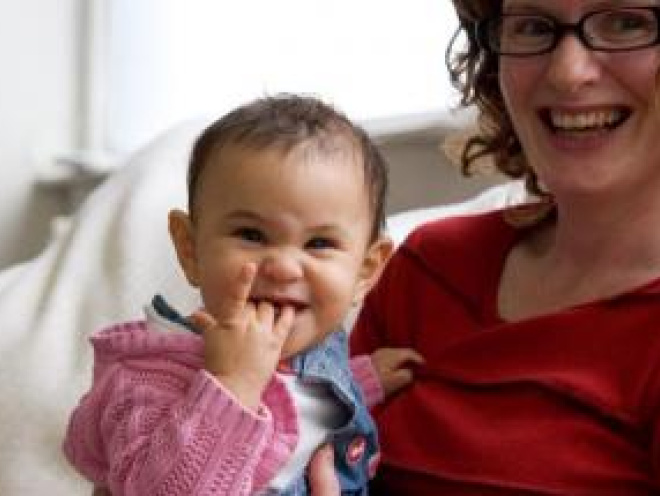Here we look at life with your 3-6 month old. How might you be feeling, what changes can you expect and what support is available?
At three to six months old, babies are sometimes referred to as ‘settled’, as this is the stage at which they generally become more predictable and manageable.
Cry baby
Your baby will still be sleeping for longish periods but will be ready for social play when he is awake. Crying and fussing usually decreases at this stage, often because mums and dads have a better understanding of their baby’s behaviour. However, babies who cried a lot in the early weeks may still be difficult to manage during this period (see ‘Coping with a crying baby’).
Parents of babies who do cry a lot might begin to see differences between their experience of life as a parent and the experiences of their friends at this stage. Although it can make you feel like you are doing something wrong, it’s important to remember that you’re not and that this difficult stage (like others) will pass eventually. Try not to focus on the idealised image of perfect parents and docile babies and value and reward yourself for what you’re doing.
Learning together
In the first five years of his life, your baby will learn more rapidly than he will at any other stage (see ‘Play and your child’s development’). Your relationship with him and how you communicate will help him to understand how people respond to each other and develop social skills for life.
Talking to your baby about what is going on around him; sharing books together and talking through activities will help him develop his communication skills. Although it can feel strange at first, most parents find that they can chat easily and frequently to their baby by the time he reaches six months.
Milestones are just a marker
Information about what babies ‘should’ be doing at a certain stage can sometimes be reassuring. However, it’s important to remember that milestones are just markers rather than set in stone. Babies learn and develop at different rates, so let him progress at his own pace and encourage his achievements, whether he is a cautious walker or an early chatterbox.
Development is a ‘what’ and ‘how’ rather than a ‘when’. If your baby is mastering a skill, it’s better to leave him to fully grasp that stage of development rather than push him onto the next. Sometimes, your baby may seem to lose a skill he was previously confident in due to concentrating on gaining a new ability. Similarly, if he is ill, he may temporarily regress with his movement. However, as soon as he’s feeling well again, or gained a new skill, he will soon pick up where he left off. Once he has gained the new skill, you will see that the old ones are still present and he will often use all his abilities to move onto the next developmental stage.
Mixed emotions
Some parents find their baby’s move towards greater independence quite difficult, as that initial stage of babyhood is left behind. It can also create new anxieties in mums and dads who feel they have just learnt to cope with their baby and will now have to adjust again. Check out your local NCT branch and see what activities are happening in your local area. Going along to an event will enable you to make friends and allow you to share your worries and parenting tips with other parents in a similar situation to yourself.
You might find that talk can turn to how everyone’s baby is doing, which can lead to pressure. If this makes you feel uncomfortable, you can try another group or avoid those mums and dads with a tendency for competitive parenting.
Getting support
If you are ever concerned about any aspect of your baby’s development, seek support. Your health visitor or GP will be able to help and you don’t have to wait until routine development checks to ask. In most cases, you will be reassured that everything is OK, but occasionally it may mean that your child needs extra help and support.
Further information
Our support line offers practical and emotional support with feeding your baby and general enquiries for parents, members and volunteers: 0300 330 0700.
You might find attending one of NCT's Early Days groups helpful as they give you the opportunity to explore different approaches to important parenting issues with a qualified group leader and other new parents in your area.
Make friends with other parents-to-be and new parents in your local area for support and friendship by seeing what NCT activities are happening nearby. Words for Life, a dedicated website from the National Literacy Trust, provides clear information about early communication skills and is a great resource for ideas on bringing these skills into your baby’s everyday life.
NHS Choices has information on what to expect during your child's developmental check-ups.
Start4Life posts some ideas on how you can incorporate active play into your baby's day.





